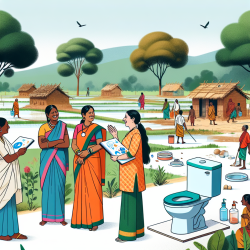Understanding Sanitation Insecurity: A Call to Action for Practitioners
Sanitation insecurity, particularly in rural settings, is a multifaceted issue that extends beyond the mere presence of facilities. The research titled "Understanding and defining sanitation insecurity: women’s gendered experiences of urination, defecation and menstruation in rural Odisha, India" highlights the complex realities faced by women in these communities. As practitioners, it's crucial to delve into these findings to enhance our understanding and approach to sanitation solutions.
Key Findings and Implications
The study, conducted through free-list interviews and focus group discussions, revealed that women in rural Odisha face numerous sanitation-related challenges. These challenges are categorized into four domains:
- Sociocultural Context: Women are often constrained by societal norms that dictate when and how they can attend to their sanitation needs. This is compounded by gendered roles that prioritize household responsibilities over personal needs.
- Physical Environment: Despite having access to toilets, many women find them unsuitable for urination and menstrual management due to lack of privacy, cleanliness, and water access.
- Social Environment: The fear of being seen and shamed while attending to sanitation needs is prevalent, affecting women's dignity and social standing.
- Personal Constraints: Physical limitations, such as age or pregnancy, further complicate access to sanitation facilities, particularly in adverse weather conditions.
Implementing Research Outcomes
To address these challenges, practitioners should consider the following strategies:
- Gender-Responsive Facilities: Design sanitation facilities that cater to the specific needs of women, including privacy, accessibility, and suitability for all sanitation activities.
- Community Engagement: Involve women in the decision-making process regarding sanitation solutions to ensure their needs and preferences are prioritized.
- Education and Awareness: Conduct educational programs that address the sociocultural barriers and promote gender equality in sanitation practices.
- Policy Advocacy: Advocate for policies that recognize sanitation as a human right and focus on comprehensive solutions that address all aspects of sanitation insecurity.
Encouraging Further Research
This study lays the groundwork for future research to validate or refine the proposed definition of sanitation insecurity. Practitioners are encouraged to conduct further studies in different settings and populations to enhance our understanding of this issue. By doing so, we can develop more effective interventions that improve women's sanitation circumstances globally.
To read the original research paper, please follow this link: Understanding and defining sanitation insecurity: women’s gendered experiences of urination, defecation and menstruation in rural Odisha, India.










